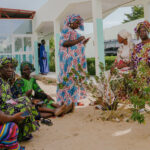
Japan, South Korea and the United States criticised China and Russia for vetoing a United Nations resolution on Thursday that sought to punish North Korea for its recent intercontinental ballistic missile launch.
Thursday’s US-drafted resolution in the UN Security Council would have pared back the amount of oil North Korea could legally import for civilian purposes from 4 million barrels annually to 3 million barrels and cut the level of refined petroleum.
“The vetoes today are dangerous. Those members have taken a stance that not only undermines the Security Council’s previous actions to which they’ve committed, but also undermines our collective security,” said Linda Thomas-Greenfield, the US ambassador to the UN, on behalf of the three nations. “These tests are dangerous. They are destabilising …. They pose a threat, not just to [North Korea’s] neighbours, but to the entire world. This must stop.”
Do you have questions about the biggest topics and trends from around the world? Get the answers with SCMP Knowledge, our new platform of curated content with explainers, FAQs, analyses and infographics brought to you by our award-winning team.
Washington and Seoul reported that North Korea, also known as the Democratic People’s Republic of Korea (DPRK), fired three missiles on Wednesday, including one that may have been Pyongyang’s largest intercontinental ballistic missile, or ICBM, to date, hours after US President Joe Biden visited the region. The missile launches, totalling 23 this year, represent a “threat to the peace and security of the entire international community,” Thomas-Greenfield said.
Thirteen members of the 15-member Security Council supported the resolution. Of the 15, only five permanent members – China, Russia, the US, Britain and France – have veto power. The remaining 10 positions rotate among other nations.
China, North Korea’s closest ally, bridled at the imposition of sanctions against Pyongyang despite supporting similar measures in the past.
This follows growing polarisation between democratic and autocratic states and an unprecedented sanctions campaign by the US and numerous Western allies directed against Russia following Moscow’s February 24 invasion of Ukraine.
The US “should not place one-sided emphasis on the implementation of sanctions alone. It should also work to promote a political solution,” China’s ambassador to the UN Zhang Jun said on Thursday.
Russia, which has struggled to import vital technology and seen overseas accounts and the assets of its oligarchs frozen since the invasion, accused Washington of ignoring North Korea’s request to ease hostilities.
“It seems that our American and other Western colleagues are suffering from the equivalent of writer’s block,” said Russian ambassador Vassily Nebenzia. “They seem to have no response to crisis situations other than introducing new sanctions.”
Thomas-Greenfield said this was the first time in 15 years that Security Council members – without mentioning China or Russia by name – had used a veto to stop the council from holding North Korea accountable for unlawful testing and the proliferation of weapons of mass destruction.
The Security Council agreed to impose sanctions on North Korea after its first nuclear test blast in 2006. It tightened these in 10 subsequent resolutions in following years, trying unsuccessfully to contain Pyongyang’s nuclear and ballistic missile programmes and halt its financing.
“We three countries reaffirmed our unwavering commitment to the complete, verifiable and irreversible denuclearisation of the DPRK,” Thomas-Greenfield said on Thursday. “We urge the DPRK to invest in its people instead of its destabilising weapons.”
In an explanation of China’s veto, Zhang said its action was taken in part because of “the negative impact on the DPRK’s domestic response to Covid-19”, blaming the lack of dialogue and negotiation on the US.
“Additional sanctions against the DPRK will not help resolve the problem, but only lead to more negative effects and escalation of confrontation,” Zhang said. “The situation on the peninsula has developed to what it is today, primarily due to the flip-flop of the US policies, and its failure to uphold the results of previous dialogue. This is an undeniable fact.”
Thomas-Greenfield countered that the US had made “serious, sustained efforts, publicly and privately, to pursue diplomacy with the DPRK without preconditions”. She said the US, Japan and South Korea would continue to speak out and work together to protect the region and the world “from the DPRK’s continued and unprovoked escalations”.
This article originally appeared in the South China Morning Post (SCMP), the most authoritative voice reporting on China and Asia for more than a century. For more SCMP stories, please explore the SCMP app or visit the SCMP’s Facebook and Twitter pages. Copyright © 2022 South China Morning Post Publishers Ltd. All rights reserved.
Copyright (c) 2022. South China Morning Post Publishers Ltd. All rights reserved.




